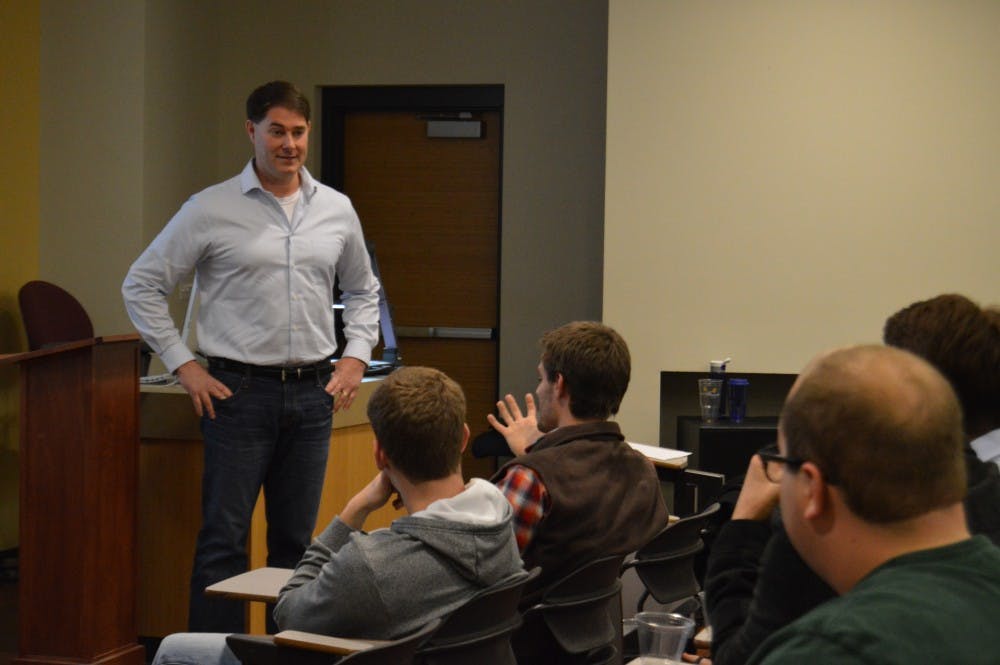Politically correct is defined as: marked by or adhering to a typically progressive orthodoxy on issues involving especially ethnicity, gender, sexual orientation or ecology, according to dictionary.com.
Political correctness was a hot topic when Aaron W. Dimmock came to speak to a group of students.
The U.S. Navy Commander, who serves as the Navy Representative to the Senior Advisor to the Secretary of Defense for Military Professionalism, had an open discussion with students April 12 on issues the nation is facing today.
The conversation was audience-based, and members choose topics that surrounded ethics and morals. He worked to frame those issues around the concepts in the Declaration of Independence and Constitution of the U.S.
“We talk about ethics and morals together but they are not the same things. Morals are internal, and ethics are external,” Dimmock said. “Your morals are what give you the appreciation and provide you the structure for what is right and what is definitely wrong. Ethics is culturally and society based depending on where you plant yourself. You can have a right interpretation versus a right interpretation — what I believe and what you believe. There is nothing saying that we aren’t both right and we aren’t both wrong.”
After these concepts were defined, students got to voice issues that they felt dealt with ethics and morals.
These topics included human trafficking, conflict resolution, the American dream, politics in Europe and the effect on foreign policy, the threat of terrorism and political correctness.
The first and most heated topic chose for conversation was political correctness.
“My biggest thing is America was an idea,” said Matt Organ, a junior telecommunications major. “Political correctness kills ideas.”
Dimmock agreed. He said political correctness is a detrimental and hot topic.
“It is not conducive that we have to question ourselves with every little thing that we do and we say," Dimmock said. "We, especially at a college level, stop and think on whether or not what we are going to say is offensive to someone and if it is or is not politically correct. It is completely debilitating.”
People are scared to ask questions and bring about important conversations because political correctness has created a lack of safe environments for thought and development, Dimmock said.
“You shouldn’t be held down with what it is that you are thinking or what it is that you are saying — you should have safe environments where you can share safely,” Dimmock said. “We need those environments to agree, to disagree and where we are able to focus on issues unemotionally.”
Michael Campton, a sophomore business major, said political correctness has affected him. Because of it, he does not share his political views based on the environment.
“I am a big Donald Trump supporter,” Campton said. “I don’t wear my Donald Trump shirt. I chose not to wear it because I am afraid I am going to be called a name going to class. I don’t put a sticker on my car, I don’t want my car to get keyed. I know that happens, which is why I don’t and I keep quiet. Unfortunately, that is imposing on my free speech.”
Dimmock said that's why that political correctness mindset can be dangerous.
“So Mr. Trump says something that is racial, you like Mr. Trump," Dimmock said. "I think because he is racial, you are racist, [which is] non-sensible — completely non-sensible. Why would you be brought to that conclusion? But we do it all the time because it is irrational behavior and irrational thinking. But we do that. It is an identity thing and a bias.”
Number wise, there are a lot of people who are against political correctness but are silent, Dimmock said, and the reason the ones who are “propagandas” or for political correctness are so strong is because they are vocal.
Sophomore accounting major Kristin Baker agreed.
“I think [small groups who support political correctness are] so strong with them because the silent majority who don’t agree with it, we are the ones who are offending people who do agree with it,” Baker said. “So technically, what we have established and those values are looked at as being in the wrong. It’s hard to overcome that perception and have more people see that.”
Dimmock said it is important to switch the fixed mindset to a growth mindset in regards to political correctness, and while there is no real solution, there is way to bring change.
“Hopefully some ideas are there and you can take these and continue to think on them more and realize that they are not easily solvable," he said. "They are just the issues of life.”
Dimmock’s discussion was hosted by the Student Government Association, College Republicans and University Democrats.
It was not until the end of the conversation though that Dimmock discussed the title of the conversation: "Navigating the Maelstrom: Answering the Call as Envoys for a Life of Service."
“You can take that multiple ways, but the way I like to phrase it is there are storms everywhere and they are constant,” Dimmock said. “But who you are as an individual and who you are becoming is a part of the process of engaging with others, trying to make yourself and others better. Realizing the reality and pain that is there but reflecting on it in a safe environment so you can establish progress. Those are answering the call as an envoy for a life of service.”





